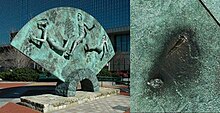| Centennial Olympic Park Bombing | |
|---|---|
| Part of terrorism in the United States | |
 Bomb fragment mark on Olympic Park sculpture | |
| Location | Atlanta, Georgia, United States |
| Coordinates | 33°45′38″N 84°23′33″W / 33.76065°N 84.392583°W |
| Date | July 27, 1996 1:20 am (EDT) |
| Target | Centennial Olympic Park |
Attack type | Bombing |
| Weapons | Pipe bomb |
| Deaths | 2 (1 directly, 1 indirectly) |
| Injured | 111 |
| Perpetrator | Eric Rudolph |
| Motive | Christian terrorism, Far-right extremism, anti-abortion violence |
The Centennial Olympic Park bombing was a domestic terrorist pipe bombing attack on Centennial Olympic Park in Atlanta, Georgia, on Saturday, July 27, 1996, during the Summer Olympics. The blast directly killed one person and injured 111 others; another person later died of a heart attack. It was the first of four bombings committed by Eric Rudolph in a terrorism campaign against the U.S. government which he accused of championing "the ideals of global socialism" and "abortion on demand".[1][2] Security guard Richard Jewell discovered the bomb before detonation, notified Georgia Bureau of Investigation officers, and began clearing spectators out of the park along with other security guards.
After the bombing, Jewell was initially investigated as a suspect by the Federal Bureau of Investigation and news media aggressively focused on him as the presumed culprit when he was actually innocent. In October 1996, the FBI declared Jewell was no longer a person of interest. Following three more bombings in 1997 and 1998, Rudolph was identified by the FBI as the suspect. In 2003, Rudolph was finally captured and arrested, and in 2005 he agreed to plead guilty to avoid a potential death sentence. Rudolph was sentenced to life imprisonment without parole for his crimes.[3]
- ^ Gross, Doug (April 14, 2005). "Eric Rudolph Lays Out the Arguments that Fueled His Two-Year Bomb Attacks". San Diego Union-Tribune. Associated Press. Archived from the original on September 2, 2018. Retrieved March 27, 2019.
- ^ Cite error: The named reference
NPRwas invoked but never defined (see the help page). - ^ "CNN.com - Rudolph agrees to plea agreement - Apr 8, 2005". www.cnn.com. Retrieved March 26, 2024.
